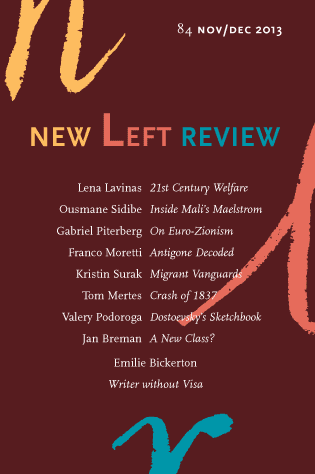
CONTENTS
-
Lena Lavinas: 21st Century Welfare
Latin America as laboratory for conditional cash transfers, fast becoming the hegemonic social-protection paradigm for the Global South. In a comparative survey, Lena Lavinas reveals the CCT model as a strategy for the financialization—not abolition—of poverty.
-
Gabriel Piterberg: Euro-Zionism and its Discontents
Engagement with the work of Hebrew poet Yitzhak Laor on the origins and function of the new Holocaust remembrance culture in Germany, Italy and France. What relation does this bear to parallel developments in Israel and the United States?
-
Ousmane Sidibe: The Malian Crisis
A legal scholar discusses his country’s post-colonial history. The collapse of an effective state laid bare by the crises of 2012—insurgency in the north, coup in the capital—now compounded by ongoing French and UN interventions.
-
Kristin Surak: Guestworkers: A Taxonomy
A typology of Gastarbeiter programmes and their function in capitalist labour regimes, from Wilhelmine Prussia to the Gulf monarchies. Side effects of attempts to import a disposable reserve army of labour, and the tensions they provoke between capital accumulation and state legitimacy.
-
Franco Moretti: ‘Operationalizing’
Can ‘digital humanities’ recover from Thomas Kuhn’s before-the-fact critique—that no new ‘laws of nature’ will be discovered just by inspecting the numbers? Testing the limits of the approach, Moretti investigates whether data-crunching can falsify Hegel’s theory of tragedy.
-
Valery Podoroga: Dostoevsky’s Plans
Manuscripts and drafts as proliferations of possible novels, exceeding many times over the confines of the texts Dostoevsky finally published.
-
Jan Breman: A Bogus Concept?
Jan Breman on Guy Standing, The Precariat. Emergence of a global ‘dangerous class’?
-
Emilie Bickerton: Planet Malaquais
Emilie Bickerton on Geneviève Nakach, Malaquais rebelle. Biography of a world-wandering modernist writer.
-
Tom Mertes: Crash of 1837
Tom Mertes on Alasdair Roberts, America’s First Great Depression. Political outcomes of economic crisis in the antebellum United States.
Articles:
-
Ousmane Sidibe,
‘The Malian Crisis’
A legal scholar discusses his country’s post-colonial history. The collapse of an effective state laid bare by the crises of 2012—insurgency in the north, coup in the capital—now compounded by ongoing French and UN interventions.
-
Franco Moretti,
‘Operationalizing’
Can ‘digital humanities’ recover from Thomas Kuhn’s before-the-fact critique—that no new ‘laws of nature’ will be discovered just by inspecting the numbers? Testing the limits of the approach, Moretti investigates whether data-crunching can falsify Hegel’s theory of tragedy.
-
Emilie Bickerton,
‘Malaquais’
Emilie Bickerton on Geneviève Nakach, Malaquais rebelle. Biography of a world-wandering modernist writer.
Editorials:
-
2011,
Echoes of past rebellions in 2011’s global upsurge of protest. Against a backdrop of world economic slump, what forces will shape the outcome of contests between a raddled system and its emergent challengers?
-
Arab Concatenation,
From Tunis to Manama, 2011 has brought a chain-reaction of popular upheavals, in a region where imperial domination and domestic despotism have long been entwined. A call for political liberty to reconnect with social equality and Arab fraternity, in a radical new internationalism.
-
NLR at 50,
What remains of the neo-liberal order after the implosion of 2008—with what implications for a journal of the left? Notes for a future research agenda, as NLR enters its quinquagenary year.
-
Wall Street Crisis,
Against mainstream accounts, Peter Gowan argues that the origins of the global financial crisis lie in the dynamics of the New Wall Street System that has emerged since the 1980s. Contours of the Atlantic model, and implications—geopolitical, ideological, economic—of its blow-out.
-
NPT,
What are the geopolitical origins of the NPT, and what are its actual effects? Non-proliferation as nuclear privilege of the few, weapon of intimidation of the one, submission of the many—and its impact on the peace movement.
-
Afghanistan,
Reasons for the West’s stalemate in Afghanistan sought neither in lack of troops and imperial treasure, nor in Pakistani obstruction, but in the very nature of the occupation regime. Tariq Ali on the actual results of ‘state-building’ in the Hindu Kush, as a broken country is subjected to the combined predations of NGOs and NATO.
-
Concert of Powers,
A reckoning of global shifts in political and economic relations, with China emerging as new workshop of the world and US power, rationally applied elsewhere, skewed by Israeli interests in the Middle East. Oppositions to it gauged, along with theoretical visions that offer exits from the perpetual free-market present.
-
Force and Consent
As war looms again in the Middle East, what are the aims of the Republican Administration, and how far do they mark a break in the long-term objectives of US global strategy? The changing elements of American hegemony in the post-Cold War world.
Articles:
-
Tom Mertes,
‘Crash of 1837’
Tom Mertes on Alasdair Roberts, America’s First Great Depression. Political outcomes of economic crisis in the antebellum United States.
-
Gabriel Piterberg,
‘Euro-Zionism’
Engagement with the work of Hebrew poet Yitzhak Laor on the origins and function of the new Holocaust remembrance culture in Germany, Italy and France. What relation does this bear to parallel developments in Israel and the United States?
-
Kristin Surak,
‘Guestworkers’
A typology of Gastarbeiter programmes and their function in capitalist labour regimes, from Wilhelmine Prussia to the Gulf monarchies. Side effects of attempts to import a disposable reserve army of labour, and the tensions they provoke between capital accumulation and state legitimacy.
-
Valery Podoroga,
‘Dostoevsky’s Plans’
Manuscripts and drafts as proliferations of possible novels, exceeding many times over the confines of the texts Dostoevsky finally published.
-
Jan Breman,
‘A New Class?’
Jan Breman on Guy Standing, The Precariat. Emergence of a global ‘dangerous class’?

